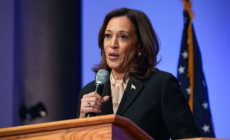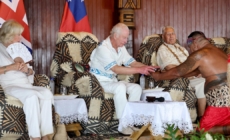-
Gen Z Men Have Gloomy View of America, Spell Bad News for Kamala Harris - 11 mins ago
-
Have the Jets been too noisy this season? | The Herd - 28 mins ago
-
High-speed pursuit ends in deadly crash on live news - 34 mins ago
-
Frankie Muniz Opens Up On Move From Acting To Full-Time 2025 NASCAR Seat - 49 mins ago
-
Todd Chrisley removed from prison chapel position while serving 10-year sentence for fraud - 55 mins ago
-
King Charles, Queen Camilla in Samoa attend traditional ‘ava ceremony - 57 mins ago
-
Emma hayes ‘broadening’ talent pool as USWNT looks ahead to 2027 world cup - about 1 hour ago
-
He crashed the Iron Curtain, lived his dream, ‘a beautiful struggle’ - about 1 hour ago
-
Clippers ‘Insane’ Debut of The Wall Made Immediate Impression on Kevin Durant - about 1 hour ago
-
North Korean troops fighting for Russia in Ukraine ‘fair game,’ U.S. warns Putin - 2 hours ago
Map Shows Third-Party Candidates in Each State
The 2024 presidential election is seen as a toss-up between Vice President Kamala Harris and former President Donald Trump, but voters in 48 states have the option to choose a different candidate.
There are a total of 21 third-party candidates running in the election—the states with the most are Louisiana, Michigan, Minnesota, Mississippi and New Jersey with seven.
Despite the U.S. operating under what’s fundamentally a two-party system, third-party candidates for president are allowed to put themselves on the ballot across the 50 states.
All states require a certain number of signatures, which differs by state, to support a candidate’s ballot bid. Receiving enough signatures for support across the entire country can be a difficult and arduous task, especially without the backing of a large political operation.
The two most famous third-party candidates this year are independent Robert F. Kennedy Jr. and Green Party candidate Jill Stein. Kennedy was polling at 4.6 percent when he dropped out of the race in August, and Stein is currently polling at about 1 percent.
Although Kennedy dropped out and endorsed Trump, his name is still on the ballot in 28 states, and people are still able to vote for him.
Stein is not on the ballot in all 50 states but has been running a campaign to draw left-leaning voters from Harris based on her politics on climate change and the war in Gaza.

Left: Michael M. Santiago, Right: Win McNamee/Getty Images
There are some third-party candidates who appear on the ballot in only one or two states. For example, Vermin Supreme is a political satirist on the ballot only in Delaware, and Lucifer Everylove (otherwise known as Justin Case) is running as an unaffiliated candidate in Utah.
Caitlin Legacki, senior advisor for Third Way, a center-left think tank, spoke to Newsweek about this phenomenon and the impact of third-party candidates on presidential elections.
“Some of the larger third-party candidates, they’re either typically running because they believe that they have a unique perspective or that they can affect the outcome of an election,” Legacki said.
Discussing candidates who run in only one state, Legacki said: “There’s no point in doing that. I think in every one of those situations, the person has a different rationale for doing it…because of the way that our electoral system works. It’s really hard to win even if you’re on all 50 ballots, and it’s definitely impossible if you’re only on one or two.”
Legacki was clear in her assertions that voting for a third-party candidate this year is “effectively a vote for Donald Trump.”
In her assessment, “fundamentally, there is Donald Trump. And then there is a much broader coalition of anti-Donald Trump voters that includes people who are excited and eager to vote for Kamala Harris…if you are voting either for Trump, or voting for someone not named Kamala Harris, you are actively supporting Donald Trump.”
But a poll reported on by Newsweek showed that Stein’s campaign was having a detrimental effect on Trump’s polling. A poll conducted by Noble Predictive Insights in mid-October showed Harris ahead of Trump 49 percent to 47 percent. However Trump’s support dips to 46 percent among respondents when they included Stein as an option, while Harris maintained her 49 percent support.
When asked about whether the U.S. at some point can shift from being a fundamentally two-party system to one that has a wider pool of presidential nominees, Legacki said: “I think a much more tangible way to change the system and have an effect on who is in office is to either run for office yourself or vote in local and state elections to change the people that are currently in office.”
Do you have a story we should be covering? Do you have any questions about this article? Contact LiveNews@newsweek.com
Source link






























